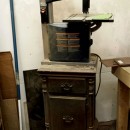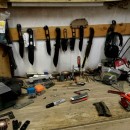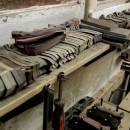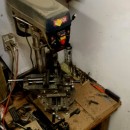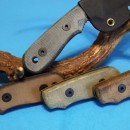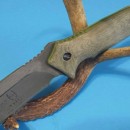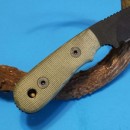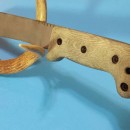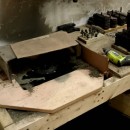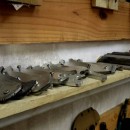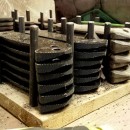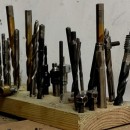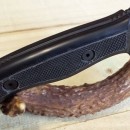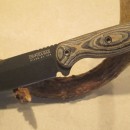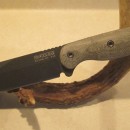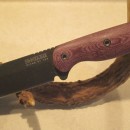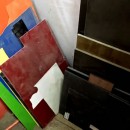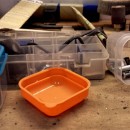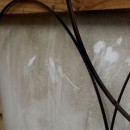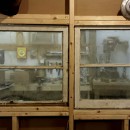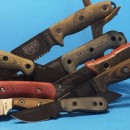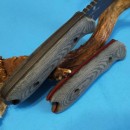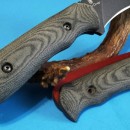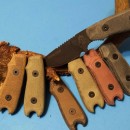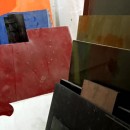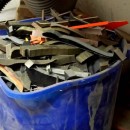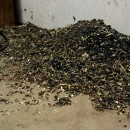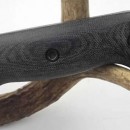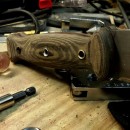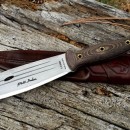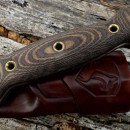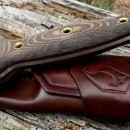LMF Knives – The Knifemakers Series
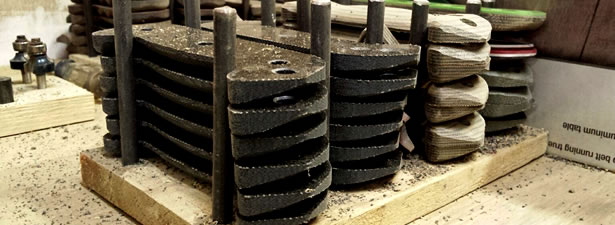
Knifemakers From Around the World
In the second installment of the Knifemakers From Around the World series, we’ll be spending some time talking with Joe Snarski from LMF Knives. He is a knifemaker out of Cowpen, South Carolina specializing in custom handcrafted micarta scales. So now let me introduce you to Joe…
Joe started making custom knives just for fun back in 2008 when he learned to craft micarta handles and scales for them. As his friends and family saw the beautiful work that he was doing, it wasn’t long before they were asking him to make them for their knives too. Joe continued to improve his craft making knives and scales here and there until one day a friend asked him to make a pair of custom scales for his Becker BK2 where he stumbled upon one of his missions in life. I think Joe says it best, “my mission became very clear – I had to rid the world of these Grivory monstrosities.”
As Joe further honed his craft, he developed a system for making scales quickly and accurately by hand without the need of a high-dollar CNC machine or any other specialized equipment. Just a small bandsaw, benchtop router, belt sander, drill press and some common hand tools are all he needs to to get the job done.
Not only do Joe’s handles and scales improve the look of a knife, he also works very hard to enhance the way they feel in your hand as well. Sometimes that is as simple as increasing the size of the palmswell. But as he develops each set, they are always painstakingly tested to ensure a perfect fit around the tang and in the stock sheath. He is always careful not to change the form factor of the handle so stock and third-party leather and kydex sheaths will work without any customization necessary.
Another improvement that he commonly implements consists of using round press-fit nuts instead of those cheap-looking hex nuts that we all love to hate. It is amazing how much this simple change can enhance the overall look of a knife when it is done, and for those handles without removable scales, he also offers a wide-variety of pin and tube material options to choose from.
The first custom scales that he began to sell publicly were for the larger Becker models, but that quickly expanded to include the shorter Becker models as well. Then, Joe started to receive requests to make custom contoured scales that are comfortable to wield for many of the ESEE knives to replace those flat factory scales that they come with. After a lot of experimentation, testing, and surveying of his ideas, he was finally able to come up with a shape that he could be happy with. Since then, he has started making custom scales for many popular Schrade models, and even the TOPS Tibo as well.
Joe stocks only US-made micarta in many common colors including double black, OD green, Camo, black and tan layered, natural brown, and maroon. All of the colors can be highly polished for a smooth look, sandblasted for a rough texture, or polished and then bead-blasted for a perfect compromise between the two. Custom colors are always available at an additional cost, but they also increase the turnaround time.
Additionally, G10 and carbon fiber liners can be added to any set. They are epoxied onto the micarta prior to shaping so there are no issues with the fit and finish. They are available in orange, yellow, white, red, blue, and neon green.
The current line of scales include Becker BK models 2-12, 15-17, 21 and 24, ESEE models 3, 4, 5, 6 and Izula, Schrade models SCHF9, SCHF36-38, SCHF42-42D, SCHF51-52 and the TOPS Tibo. Most orders take less than a week to produce, but that can always vary a little based on the availability of materials. All scales are 100% GUARANTEED so if you don’t like them, they can be exchanged or returned.
Not only is Joe constantly expanding his line of custom scales, he is always open to take on one-off projects for any supplied knife. To contact Joe or to see more photos of his work, you can always find him on Facebook @ LMFKnives.
And now for a little Q & A…
What does the LMF of LMF Knives stand for?
Lucky “guy.” I’ve always felt like a lucky person and good things always seem to fall into my lap. It really peeves my wife off and she’s been known to call me a luck “guy” often.
Is LMF Knives a full or part time gig?
Just part time. No plans on going full any time soon.
Which industry shows do you attend?
None yet. Currently I’m only planning on going to Blade next year.
What made you decide to start making custom knives and scales?
I’ve always been fascinated by knives, as most guys are, so I started making small knives from old band saw blades that I got from where I work. I soon started buying O1 flat bar to make bigger, thicker knives. I was heat treating them myself in a homemade coffee can forge. I made these for fun and gave them to friends and family. I looked into selling knives, but saw it was a very competitive market with a lot of good knife makers out there. About that time, a friend asked if I would make a set of scales for his Becker BK2. After seeing that I could replicate the stock ones in micarta, he told me that I could easily sell a lot of them and urged me to go into business, so I started making scales instead of knives. I still make some knives for friends and myself, when I have time.
Your mission is “To rid the world of plastic, rubber and flat scales!” Besides canvas micarta and G10, what other materials do you like to work with?
I mainly work with canvas micarta since it has the best dry and wet grip while having a warm feel to it. Recently, I purchased some carbon fiber sheets for making higher end neck knife scales.
You make custom micarta scales for a wide-variety of production knives, but what was your favorite custom project?
My favorite has been the EK Effingham Commando fighting dagger, which I’m currently finishing up. This knife came with a brass guard and a paracord-wrapped tang. I encased the handle section of the tang with OD green micarta slabs and neon green and black liners. Then I added a brass plate to the end of the micarta handle so the tang sticks out past the brass bolster. The handle is held on with flared brass tubing and the rear plate is pinned.
What are your favorite knives?
TOPS Tibo, ESEE 3, Schrade SCFH42, and the Becker BK2.
What is your Every Day Carry?
ZT350, Boker Exskelibur, or the TOPS Tibo.
How long does it typically take to make a set of scales?
30 to 60 minutes. Production scales typically take 30 minutes, but liners and custom grinds take longer.
What are you currently working on?
Developing production scales for the Schrade SCFH9 and a couple of custom orders: a WWII era CaseXX bolo and an EK Effingham Commando.
What is your design process?
The first step is to determine if the current scales are ergonomic for the intended use of the knife, or if they need to be reshaped. When reshaping, consideration needs to be taken to ensure the scales will fit into most aftermarket sheaths, be it leather or kydex. I want people to be confident that they can get a custom kydex sheath for their knife, without the need to have it custom fit for my scales.
I try to stay with traditional coke bottle or pear shaped profiles; they seem to be the most user friendly for the long term use of a knife. After the profile is decided upon, I start drilling and making my profile templates. This whole process can take up to 20 hours of work for some of the production scales that I make.
What do you like most about making scales?
Designing custom tools and jigs, and redesigning stock scale profiles to be more user friendly.
What do you like least about making scales?
Drilling the counterbores and all the dust.
Do you still make custom knives for anyone?
I make a few here and there, but they’re just for friends and myself.
What equipment do you use most in your shop?
Drill press, bandsaw, table router, belt sander, electric drill.
Which tool do you use most?
I use them all equally. Each tool has a step in the process, and each step takes about the same amount of time.
Have you ever been injured in the shop?
A few small cuts, but nothing serious…yet.
It seems like every knife maker is working on some new skill, what are you working on that is new or you are just working to get better at?
Mostly I’m just working on making my scales more consistent and making them faster, and adding more knives to my list of production scales I offer.
Who are your favorite knife makers?
BK&T (Becker) and ESEE for the big guys. They put out quality American made products at good prices, and stand behind them.
As for small manufacturers, I like most all of them. Each one has something unique to offer and most at very reasonable prices.
Who in the industry has influenced you the most?
No one.
What advice would you give someone trying to get into knife making?
Buy some bar stock and just go for it. You’ll never know if you can, unless you try.
Do you have any tips that you can share?
You don’t need expensive equipment if you’re creative and patient.
What was the hardest lesson to learn related to knife making?
Not taking it personally when a customer doesn’t like your work.
Thank you very much Joe for spending some time with us… We really appreciate it.
![]()
--
